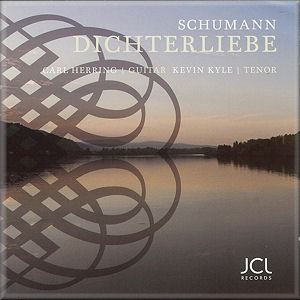 |
 |
|

Availability
JCL
|
Robert SCHUMANN (1810 - 1856)
Dichterliebe, Op. 48 (arr. Carl Herring for
guitar and voice, observing original keys throughout)
Im wunderschönen Monat Mai [1:37]
Aus meine Tränen sprießen [0:53]
Die Rose, die Lilie, die Taube, die Sonne [0:36]
Wenn ich in deine Augen seh’ [1:49]
Ich will meine Seele tauchen [0:50]
Im Rhein, im heiligen Strome [2:21]
Ich grolle nicht [1:36]
Und wüßten’s die Blumen, die kleinen [1:10]
Das ist ein Flöten und Geigen [1:16]
Hör’ ich das Liedchen klingen [2:22]
Ein Jüngling liebt ein Mädchen [1:07]
Am leuchtenden Sommermorgen [2:56]
Ich hab’ im Traum geweinet [2:53]
Allnächtlich im Träume [1:19]
Aus alten Märchen winkt es [2:39]
Die alten, bösen Lieder [4:58]
Johann Kaspar MERTZ (1806 - 1856)
Sechs Schubert’sche Lieder (Six Schubert
Songs - solo guitar)
Die Post [2:53]
Ständchen [4:07]
Das Fischermädchen [2:27]
Aufenthalt [3:26]
Liebesbotschaft [4:09]
Lob der Thränen [3:47]
 Kevin Kyle (tenor: Schumann),
Carl Herring (guitar) Kevin Kyle (tenor: Schumann),
Carl Herring (guitar)
rec. 11-12 October 2007 and 17 June 2008, St Nicholas’ Church, Great Munden,
Hertfordshire, UK
Sung texts and English translation enclosed
 JCL RECORDS JCL513 [51:17] JCL RECORDS JCL513 [51:17] 
|
|
|
Schubert’s Die schöne Müllerin has been
recorded with guitar accompaniment at least a couple of times
(Peter Schreier and Konrad Ragossnig; Olle Persson and Mats Bergström)
but I can’t recall an earlier guitar version of Dichterliebe and
a search on internet gave no hits. On the surface Schumann’s
cycle should be just as suitable as the Müllerin for
this kind of approach, and what we first hear promises well.
The introduction to the first song sounds lovely: the recording
is first rate, the instrument has beautiful tone and Carl Herring
plays deliciously. When Kevin Kyle sings the first phrases of Im
wunderschönen Monat Mai we understand that this is going
to be a toned down reading, more like a ballad-singer. His voice
is small, light and when singing in piano and pianissimo nuances
it is agreeable and flexible. The German language doesn’t
seem to come very naturally to him but his words are mainly clear.
There isn’t much variation in tone colours, though; it
is basically a grey voice and this impression is strengthened
by certain dryness. In a way it isn’t unlike Tito Schipa’s
or Alfredo Kraus’s tone; it’s like a thin layer,
a veil that should be lifted to let the natural tone come out.
I first thought Kyle was suffering from a slight cold but this
seems to be an inherent quality of his voice. With sensitive
phrasing and care for the words this could still be an attractive
- and different - reading of this much-recorded work.
But when he puts pressure on the voice in the more powerful songs,
the tone hardens and becomes strained and at forte rather unpleasant
to listen to. Im Rhein, im heiligen Strome, and Ich
grolle Nicht this is very obvious, and even though there
is a great deal of beautiful soft singing the songs lose their
impact. He has also a tendency to stress individual words or
syllables - for dramatic and expressive purposes no doubt - which
makes them obtrude and disrupt the flow of the music. Especially
the jolly and elegant Ein Jüngling liebt ein Mädchen suffers
from this over-emphasis.
As I have already implied there is a great deal of attractive
and sensitive singing - primarily in the more intimate songs,
and I believe he could have maintained this approach throughout
the cycle. I remember hearing Olle Persson and Mats Bergström
in recital on two occasions, performing Die schöne Müllerin,
and though Persson has all the requisite heft to sing the songs
in a Fischer-Dieskau manner, he scaled down the whole cycle to
true chamber music size - and it worked extremely well. Kevin
Kyle does several good things but when all is said and done this
version isn’t really competitive. For a modern tenor version
Peter Schreier with Andras Schiff at the piano on Orfeo is a
safe recommendation (see review).
Schreier was 67 when he recorded it but his voice is very little
affected by the passing years.
As a filler we are treated to six Schubert songs transcribed
for guitar solo by Johann Kaspar Mertz. He was an almost exact
contemporary of Schumann, born four years before him and died
only a few months after him. Mertz is perhaps best known for
his fantasias on operatic themes, but like Schumann he was a
great admirer of Schubert. Here he has avoided the temptation
to write virtuoso music to show off the technical ability of
the player. Instead he chose to show off Schubert’s melodic
gift, and so he did admirably. Carl Herring plays the songs -
four of which are from Schwanengesang - with elegance
and clarity and this is a fine addition to the guitar repertoire
on records.
A final question to JCL Records: Is it really necessary to print
the song-texts in white on a dark brown background? Every study
I know of points out that this substantially impairs readability.
Göran Forsling
Masterwork Index: all reviews of Dichterliebe
|
|




 All Nimbus reviews
All Nimbus reviews








